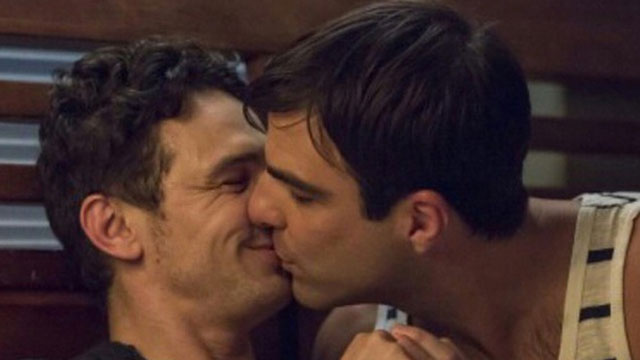This article was originally published in a slightly shorter version in Nathaniel's column at Towleroad
Nathaniel reporting from Sundance. One of the most interesting trends of this year's Sundance Film Festival is confrontational stories about people being pushed out of or willfully stepping away from their sexual comfort zones. The Diary of a Teenager Girl has earned the best reviews and the most press but let's discuss two films with more LGBT appeal. I Am Michael, a drama about religion and homosexuality, and The D Train, a comedy about a high school reunion, both feature grown men whose lives spiral out of control when they stray from their true selves. [More...]
I AM MICHAEL
How many gay kids growing up confused about what they were feeling within religious environments used this Bible verse in ways that would horrify fundamentalists?
Ask, and it shall be given you; seek, and you shall find; knock, and it shall be opened to you:
-Matthew 7:7
It's a lovely sentiment whether you're religious or not. Everyone needs to know themselves and find their own way. Those who've come before us lay down tracks for us to follow but we all still have to choose which to take or construct our own. But Matthew's promise won't work for everyone. What if you don't know what to ask, don't know what you're looking for or, like the protagonists of these movies, are totally unsatisfied with the knowledge you already have about your true character?
 In the opening scene of writer/director Justin Kelly's provocative I AM MICHAEL, Michael Glatze is introduced as an "ex-gay" pastor warning a depressed teenager away from his same-sex desires. And then we're hurled back some years to meet the same but much different Michael, presumably in order to learn how the one became the other. The eponymous sexually-confused Michael is played by James Franco in a case of so-obvious casting that what else is there to say about it? Once upon a time, as we learn after the opening scene of this true story, Michael was a semi-famous gay activist and successful magazine editor with a happy long term romance with Bennett (Zachary Quinto).
In the opening scene of writer/director Justin Kelly's provocative I AM MICHAEL, Michael Glatze is introduced as an "ex-gay" pastor warning a depressed teenager away from his same-sex desires. And then we're hurled back some years to meet the same but much different Michael, presumably in order to learn how the one became the other. The eponymous sexually-confused Michael is played by James Franco in a case of so-obvious casting that what else is there to say about it? Once upon a time, as we learn after the opening scene of this true story, Michael was a semi-famous gay activist and successful magazine editor with a happy long term romance with Bennett (Zachary Quinto).
After moving from San Francisco they invite a third, a college kid named Tyler (Teen Wolf's Charlie Carver) into their relationship because "there's enough love to go around". For what it's worth: the much buzzed about three-way sex scene starts hot but doesn't go anywhere, amounting to an underwear hugging party. Multiple scenes of Quinto and Franco cuddling in bed: much hotter with the actors totally at ease with each other and believable as long-term boyfriends.
But all is not well: Michael becomes less and less happy, has difficulty dealing with his mother's death, and is plagued with panic attacks. While editing and researching a special religion-themed issue of his new gay magazine - an idea that turns his boyfriends off - he starts furtively reading the Bible and turns away, rather radically, from his own life and gay family. In one uncomfortably amusing scene wherein he hides his Bible like it's a porno he's ashamed of, he reads another gem from the Gospels:

He that findeth his life shall lose it; and he that loseth his life for my sake shall find it.
-Matthew 10:39
Interpret that ouroborus profundity as you will and must. If St. Matthew lived today he'd surely be employed as a horoscope writer because this is just vague enough to mean anything to anyone. Its circular logic is like the crude circle Michael draws to explain to Tyler about the infinite because circles have no beginning or end. Tyler, less concerned with the infinite and more into flirting, teasingly objects, points out the beginning and the end of Michael's line drawing. Michael, unfazed and considering the infinite all the time, draws spirals referencing back to this later in the film. Willfully, or stupidly depending on how conscious you think Glatze was when he betrayed his community, Michael spirals out of control bringing still more people into his confused romantic orbit (including Emma Roberts), and hurting everyone in the process or, as implied, in the events coming after the picture wraps up.
I Am Michael has a provocative enough premise that it's hard not to be thoroughly engaged if you've ever struggled with religion, faith, and sexuality. But it's also too crudely told to totally deliver on the premise. There are thunderingly obvious instances of flashback to illustrate what we've just been told (one flashback to his mother is quite tacky). James Franco's line readings don't always dispel this weirdly pandering feeling, as he often sounds like he's talking to a very small child when he's speaking the movie's themes aloud.
 Michael's boyfriends don't know what hit them...
Michael's boyfriends don't know what hit them...
Though we're not truly in a "post-gay" world anymore than we're in a "post-racial" world, we'd probably all do better to acknowledge more fluidity in sexuality and be less judgmental about it. So long as people aren't hurting anyone, as Michael Glatze does with his "ex-gay" teachings. I Am Michael strains for sympathy with Michael's confusion but, happily, the subtle snark of its ending will appease your inner gay activist all the same. And yet, despite that smart closing scene, it's still a somehow an unsatisfying movie.
"Why are you doing this?"
Bennett keeps asking Michael, the former love of his life, in scene after scene. It's as if he's speaking the audience's thoughts aloud. No answer ever comes.
 D Train Cast & Crew: Jeffrey Tambor, Director Andrew Mogel, Kathryn Hahn, James Mardsen, Director Jarrad Paul, and Jack Black
D Train Cast & Crew: Jeffrey Tambor, Director Andrew Mogel, Kathryn Hahn, James Mardsen, Director Jarrad Paul, and Jack Black
THE D TRAIN
The subject of confusing sexual switcheroos also crops up in the far more mainstream comedy THE D TRAIN, which is directed by first time feature writer/directors Jarrad Paul and Andrew Mogel. Jack Black stars as Dan, a husband and father who is the self-proclaimed chairman of his high school's alumni committee and still caught up in being socially accepted by his former classmates. He desperately want a cool nickname and a place at the bar where he's never invited. In planning for the 20th reunion, he has the smart idea to convince the former coolest kid in school Oliver (James Marsden, more delicious than ever), who is now an actor with a national commercial spot, to return for the event and thus lure other people to RSVP.
 While visiting Oliver in Los Angeles, Dan is thrown by this former classmate's "I don't like labels" promiscuity: men, women ...old high school acquaintances? Dan and Oliver party hard, plans for the reunion are drunkenly made and all sorts of chaos follows: sexual, emotional, social, fiscal, comic, you name it.
While visiting Oliver in Los Angeles, Dan is thrown by this former classmate's "I don't like labels" promiscuity: men, women ...old high school acquaintances? Dan and Oliver party hard, plans for the reunion are drunkenly made and all sorts of chaos follows: sexual, emotional, social, fiscal, comic, you name it.
Much of the comedy is smartly edited, refreshingly nonjudgmental, and gorgeously handled by the ensemble... especially in the way they ping off each other, often derailing the agenda of their scene partner or thoroughly confusing them. The movie moves well but still takes its time on scenes that require discomfort for maximum laughs (one example: early in the movie Dan makes his sleepy son watch Oliver's sun block commercial over and over again -- it's hilarity amped up by its refusal to end.)
The D Train is messy with competing tones and plot threads but messiness is its point or perhaps its unavoidable fate. It's the story of a man who doesn't know what hit him when he cares way too much about another man's favor and affection. Black plays unpopular (for a reason) maybe a little too well. He's often hard to like even when he's landing his punchlines. But the movie belongs to James Marsden's sexually voracious self-absorbed actor. As with Enchanted, Marsden reminds us yet again that despite his considerable beauty, it's comedy, not leading man heroism, that is his true big screen calling.
The takeaway of The D Train may be a very adult one along the lines of life is messy, deal with it. But its refusal to get hung up labels, like its most popular character but without fully endorsing him, is weirdly refreshing.

Grades: I Am Michael C+; The D Train B
